Detailed Description of Jean Watson's Caring Science in Nursing
VerifiedAdded on 2022/09/17
|5
|1054
|20
Essay
AI Summary
This essay provides a detailed description of Jean Watson's Caring Science theory, which emphasizes the importance of love and care in nursing practice. It explores the origins of the theory, influenced by Florence Nightingale, and its focus on a relational approach to patient care. The essay delves into key concepts such as relational caring and caring moments, highlighting how these elements contribute to patient self-healing. Relational care, as presented, considers the complex context of patient needs, including socio-political factors, while caring moments emphasize the interpersonal connection between nurses and patients. The paper also acknowledges the theory's potential limitations in contemporary nursing environments, presenting a comprehensive overview of Watson's theory and its implications for building stronger nurse-patient relationships to improve health outcomes. References are included for further study and understanding.
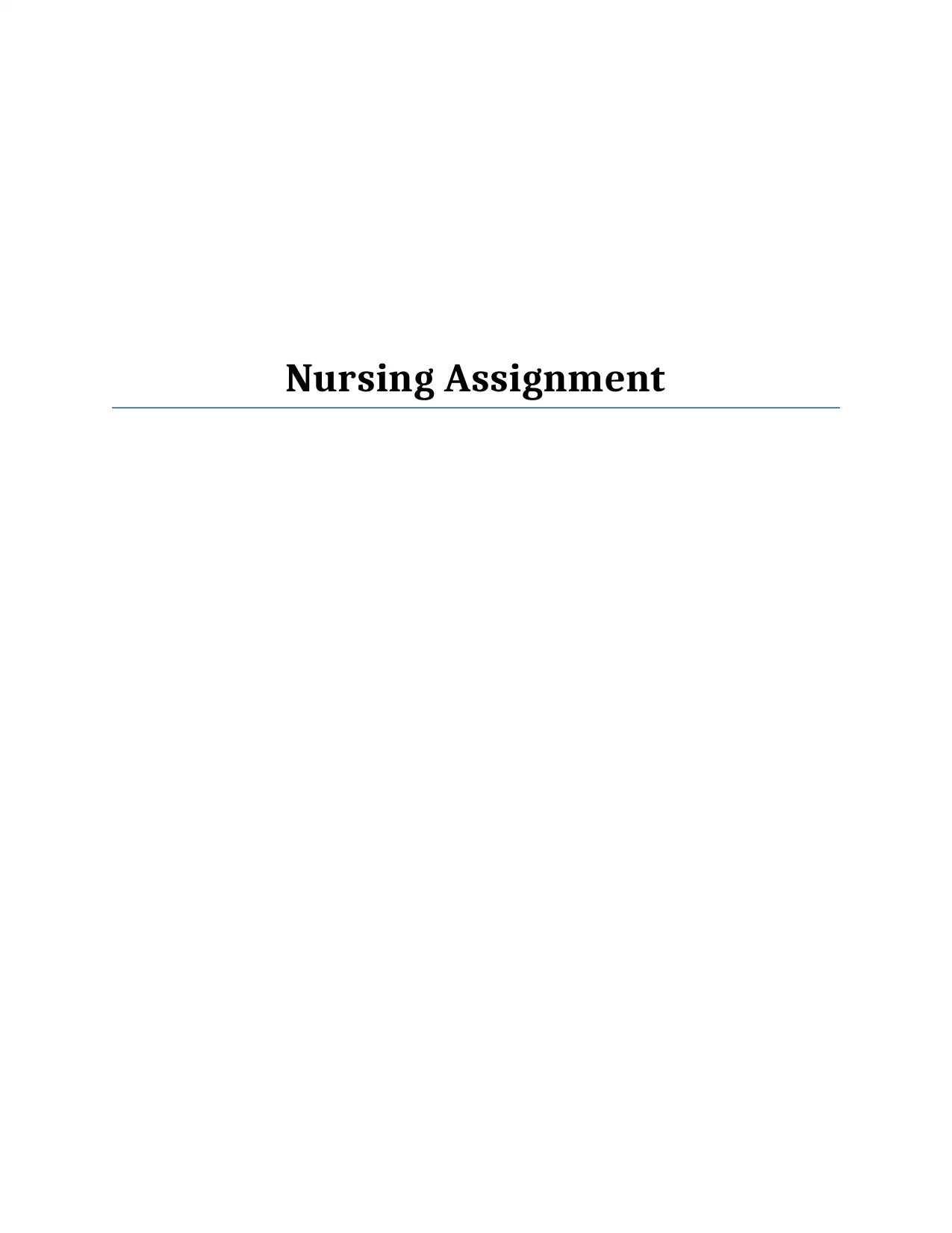
Nursing Assignment
Paraphrase This Document
Need a fresh take? Get an instant paraphrase of this document with our AI Paraphraser
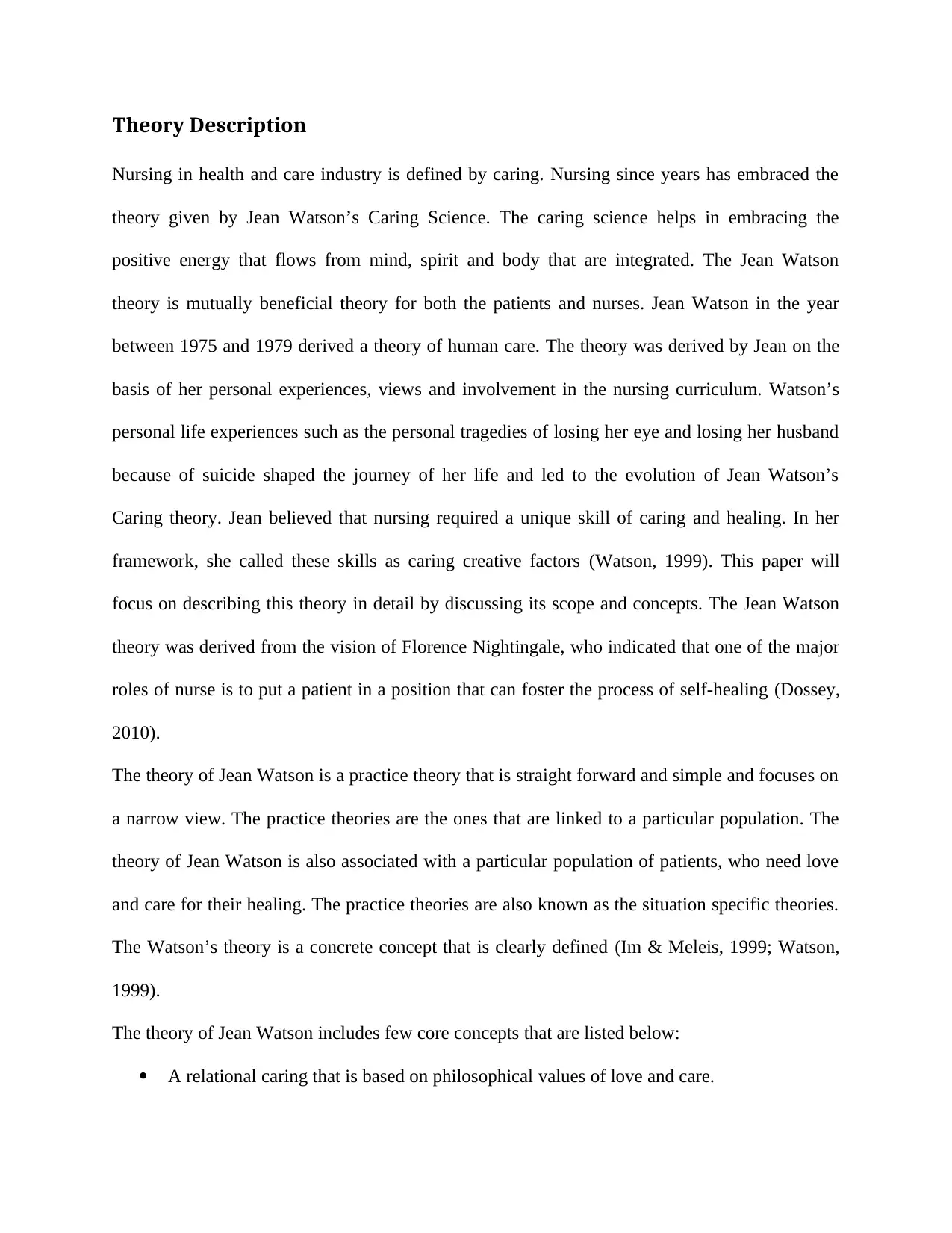
Theory Description
Nursing in health and care industry is defined by caring. Nursing since years has embraced the
theory given by Jean Watson’s Caring Science. The caring science helps in embracing the
positive energy that flows from mind, spirit and body that are integrated. The Jean Watson
theory is mutually beneficial theory for both the patients and nurses. Jean Watson in the year
between 1975 and 1979 derived a theory of human care. The theory was derived by Jean on the
basis of her personal experiences, views and involvement in the nursing curriculum. Watson’s
personal life experiences such as the personal tragedies of losing her eye and losing her husband
because of suicide shaped the journey of her life and led to the evolution of Jean Watson’s
Caring theory. Jean believed that nursing required a unique skill of caring and healing. In her
framework, she called these skills as caring creative factors (Watson, 1999). This paper will
focus on describing this theory in detail by discussing its scope and concepts. The Jean Watson
theory was derived from the vision of Florence Nightingale, who indicated that one of the major
roles of nurse is to put a patient in a position that can foster the process of self-healing (Dossey,
2010).
The theory of Jean Watson is a practice theory that is straight forward and simple and focuses on
a narrow view. The practice theories are the ones that are linked to a particular population. The
theory of Jean Watson is also associated with a particular population of patients, who need love
and care for their healing. The practice theories are also known as the situation specific theories.
The Watson’s theory is a concrete concept that is clearly defined (Im & Meleis, 1999; Watson,
1999).
The theory of Jean Watson includes few core concepts that are listed below:
A relational caring that is based on philosophical values of love and care.
Nursing in health and care industry is defined by caring. Nursing since years has embraced the
theory given by Jean Watson’s Caring Science. The caring science helps in embracing the
positive energy that flows from mind, spirit and body that are integrated. The Jean Watson
theory is mutually beneficial theory for both the patients and nurses. Jean Watson in the year
between 1975 and 1979 derived a theory of human care. The theory was derived by Jean on the
basis of her personal experiences, views and involvement in the nursing curriculum. Watson’s
personal life experiences such as the personal tragedies of losing her eye and losing her husband
because of suicide shaped the journey of her life and led to the evolution of Jean Watson’s
Caring theory. Jean believed that nursing required a unique skill of caring and healing. In her
framework, she called these skills as caring creative factors (Watson, 1999). This paper will
focus on describing this theory in detail by discussing its scope and concepts. The Jean Watson
theory was derived from the vision of Florence Nightingale, who indicated that one of the major
roles of nurse is to put a patient in a position that can foster the process of self-healing (Dossey,
2010).
The theory of Jean Watson is a practice theory that is straight forward and simple and focuses on
a narrow view. The practice theories are the ones that are linked to a particular population. The
theory of Jean Watson is also associated with a particular population of patients, who need love
and care for their healing. The practice theories are also known as the situation specific theories.
The Watson’s theory is a concrete concept that is clearly defined (Im & Meleis, 1999; Watson,
1999).
The theory of Jean Watson includes few core concepts that are listed below:
A relational caring that is based on philosophical values of love and care.
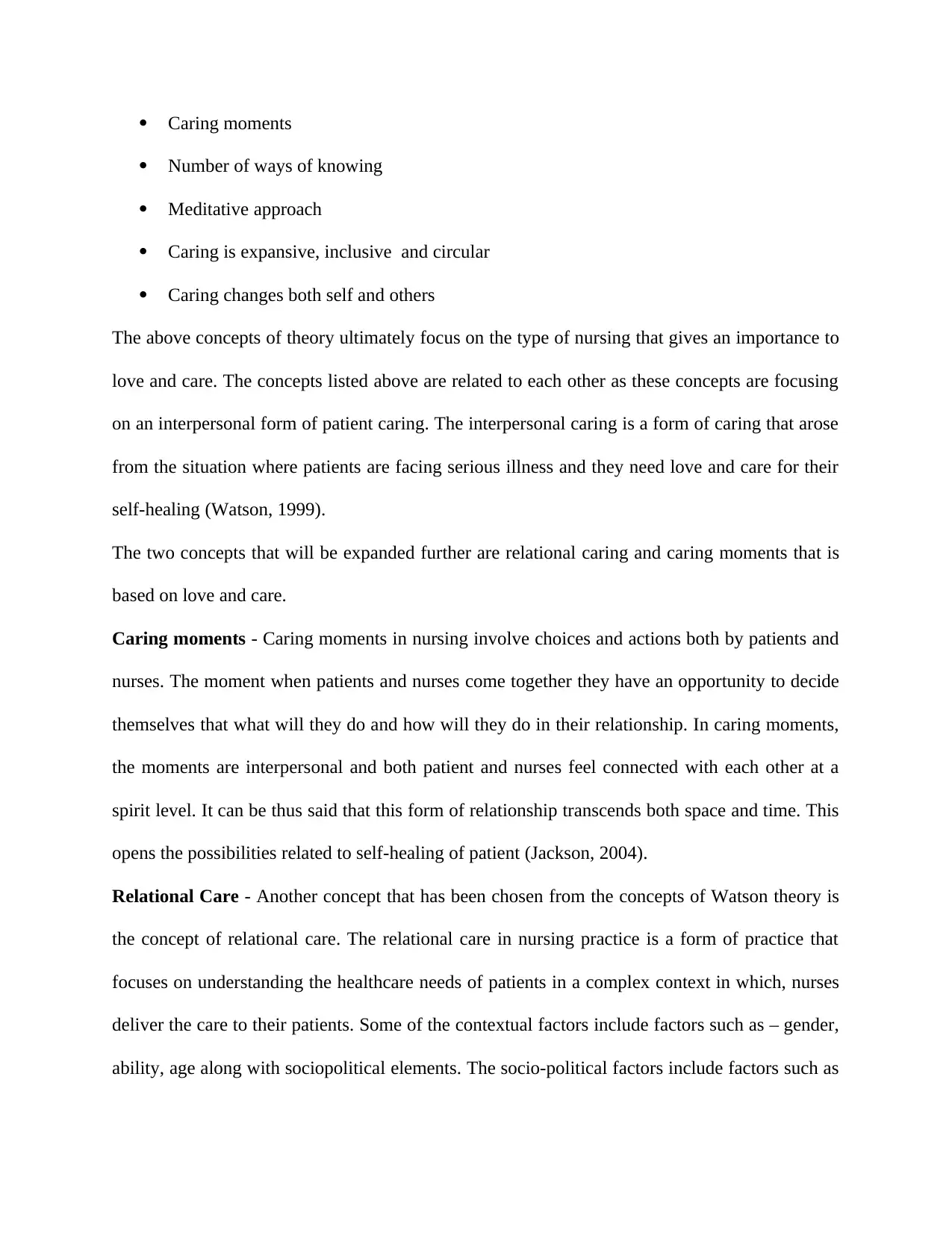
Caring moments
Number of ways of knowing
Meditative approach
Caring is expansive, inclusive and circular
Caring changes both self and others
The above concepts of theory ultimately focus on the type of nursing that gives an importance to
love and care. The concepts listed above are related to each other as these concepts are focusing
on an interpersonal form of patient caring. The interpersonal caring is a form of caring that arose
from the situation where patients are facing serious illness and they need love and care for their
self-healing (Watson, 1999).
The two concepts that will be expanded further are relational caring and caring moments that is
based on love and care.
Caring moments - Caring moments in nursing involve choices and actions both by patients and
nurses. The moment when patients and nurses come together they have an opportunity to decide
themselves that what will they do and how will they do in their relationship. In caring moments,
the moments are interpersonal and both patient and nurses feel connected with each other at a
spirit level. It can be thus said that this form of relationship transcends both space and time. This
opens the possibilities related to self-healing of patient (Jackson, 2004).
Relational Care - Another concept that has been chosen from the concepts of Watson theory is
the concept of relational care. The relational care in nursing practice is a form of practice that
focuses on understanding the healthcare needs of patients in a complex context in which, nurses
deliver the care to their patients. Some of the contextual factors include factors such as – gender,
ability, age along with sociopolitical elements. The socio-political factors include factors such as
Number of ways of knowing
Meditative approach
Caring is expansive, inclusive and circular
Caring changes both self and others
The above concepts of theory ultimately focus on the type of nursing that gives an importance to
love and care. The concepts listed above are related to each other as these concepts are focusing
on an interpersonal form of patient caring. The interpersonal caring is a form of caring that arose
from the situation where patients are facing serious illness and they need love and care for their
self-healing (Watson, 1999).
The two concepts that will be expanded further are relational caring and caring moments that is
based on love and care.
Caring moments - Caring moments in nursing involve choices and actions both by patients and
nurses. The moment when patients and nurses come together they have an opportunity to decide
themselves that what will they do and how will they do in their relationship. In caring moments,
the moments are interpersonal and both patient and nurses feel connected with each other at a
spirit level. It can be thus said that this form of relationship transcends both space and time. This
opens the possibilities related to self-healing of patient (Jackson, 2004).
Relational Care - Another concept that has been chosen from the concepts of Watson theory is
the concept of relational care. The relational care in nursing practice is a form of practice that
focuses on understanding the healthcare needs of patients in a complex context in which, nurses
deliver the care to their patients. Some of the contextual factors include factors such as – gender,
ability, age along with sociopolitical elements. The socio-political factors include factors such as
⊘ This is a preview!⊘
Do you want full access?
Subscribe today to unlock all pages.

Trusted by 1+ million students worldwide
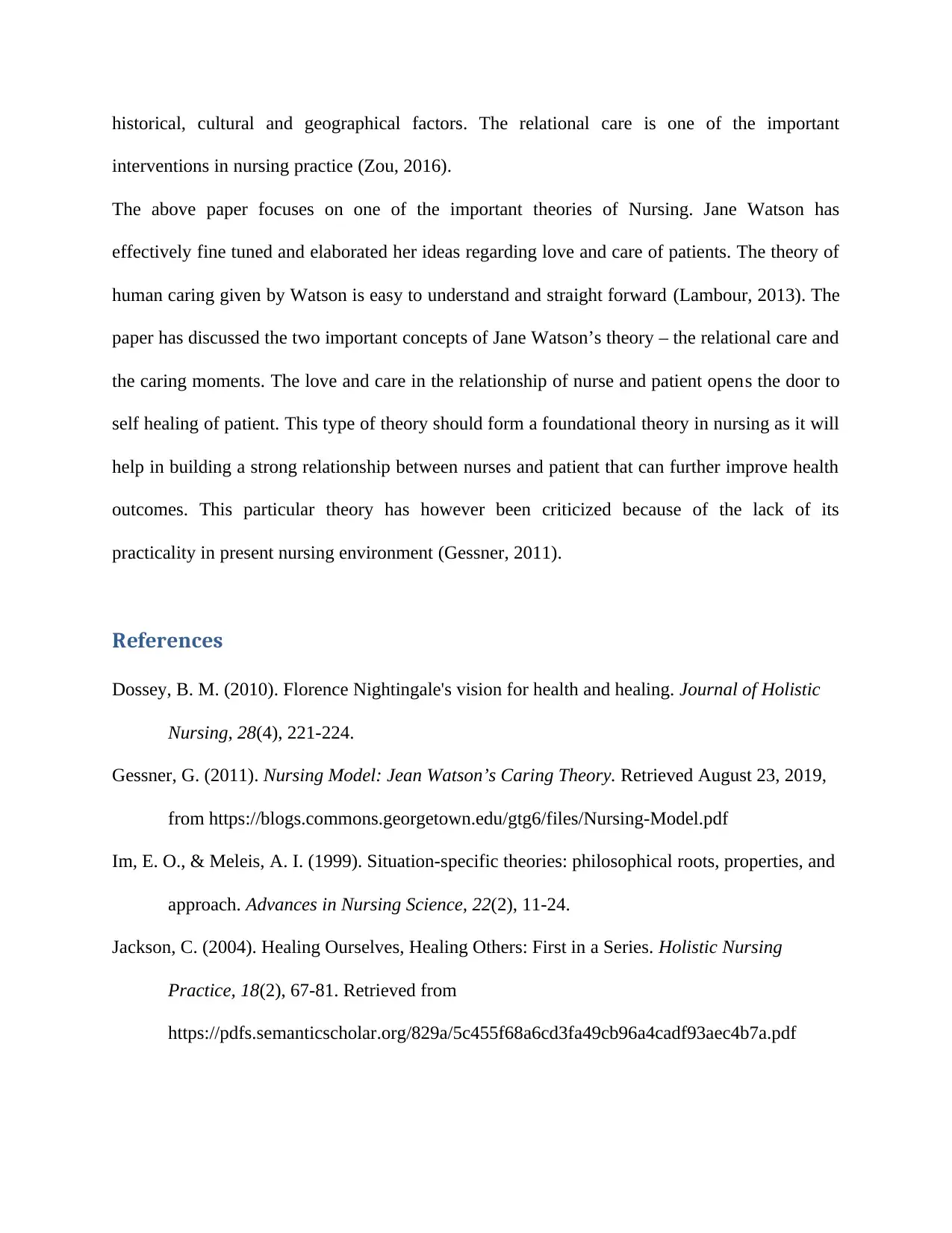
historical, cultural and geographical factors. The relational care is one of the important
interventions in nursing practice (Zou, 2016).
The above paper focuses on one of the important theories of Nursing. Jane Watson has
effectively fine tuned and elaborated her ideas regarding love and care of patients. The theory of
human caring given by Watson is easy to understand and straight forward (Lambour, 2013). The
paper has discussed the two important concepts of Jane Watson’s theory – the relational care and
the caring moments. The love and care in the relationship of nurse and patient opens the door to
self healing of patient. This type of theory should form a foundational theory in nursing as it will
help in building a strong relationship between nurses and patient that can further improve health
outcomes. This particular theory has however been criticized because of the lack of its
practicality in present nursing environment (Gessner, 2011).
References
Dossey, B. M. (2010). Florence Nightingale's vision for health and healing. Journal of Holistic
Nursing, 28(4), 221-224.
Gessner, G. (2011). Nursing Model: Jean Watson’s Caring Theory. Retrieved August 23, 2019,
from https://blogs.commons.georgetown.edu/gtg6/files/Nursing-Model.pdf
Im, E. O., & Meleis, A. I. (1999). Situation-specific theories: philosophical roots, properties, and
approach. Advances in Nursing Science, 22(2), 11-24.
Jackson, C. (2004). Healing Ourselves, Healing Others: First in a Series. Holistic Nursing
Practice, 18(2), 67-81. Retrieved from
https://pdfs.semanticscholar.org/829a/5c455f68a6cd3fa49cb96a4cadf93aec4b7a.pdf
interventions in nursing practice (Zou, 2016).
The above paper focuses on one of the important theories of Nursing. Jane Watson has
effectively fine tuned and elaborated her ideas regarding love and care of patients. The theory of
human caring given by Watson is easy to understand and straight forward (Lambour, 2013). The
paper has discussed the two important concepts of Jane Watson’s theory – the relational care and
the caring moments. The love and care in the relationship of nurse and patient opens the door to
self healing of patient. This type of theory should form a foundational theory in nursing as it will
help in building a strong relationship between nurses and patient that can further improve health
outcomes. This particular theory has however been criticized because of the lack of its
practicality in present nursing environment (Gessner, 2011).
References
Dossey, B. M. (2010). Florence Nightingale's vision for health and healing. Journal of Holistic
Nursing, 28(4), 221-224.
Gessner, G. (2011). Nursing Model: Jean Watson’s Caring Theory. Retrieved August 23, 2019,
from https://blogs.commons.georgetown.edu/gtg6/files/Nursing-Model.pdf
Im, E. O., & Meleis, A. I. (1999). Situation-specific theories: philosophical roots, properties, and
approach. Advances in Nursing Science, 22(2), 11-24.
Jackson, C. (2004). Healing Ourselves, Healing Others: First in a Series. Holistic Nursing
Practice, 18(2), 67-81. Retrieved from
https://pdfs.semanticscholar.org/829a/5c455f68a6cd3fa49cb96a4cadf93aec4b7a.pdf
Paraphrase This Document
Need a fresh take? Get an instant paraphrase of this document with our AI Paraphraser
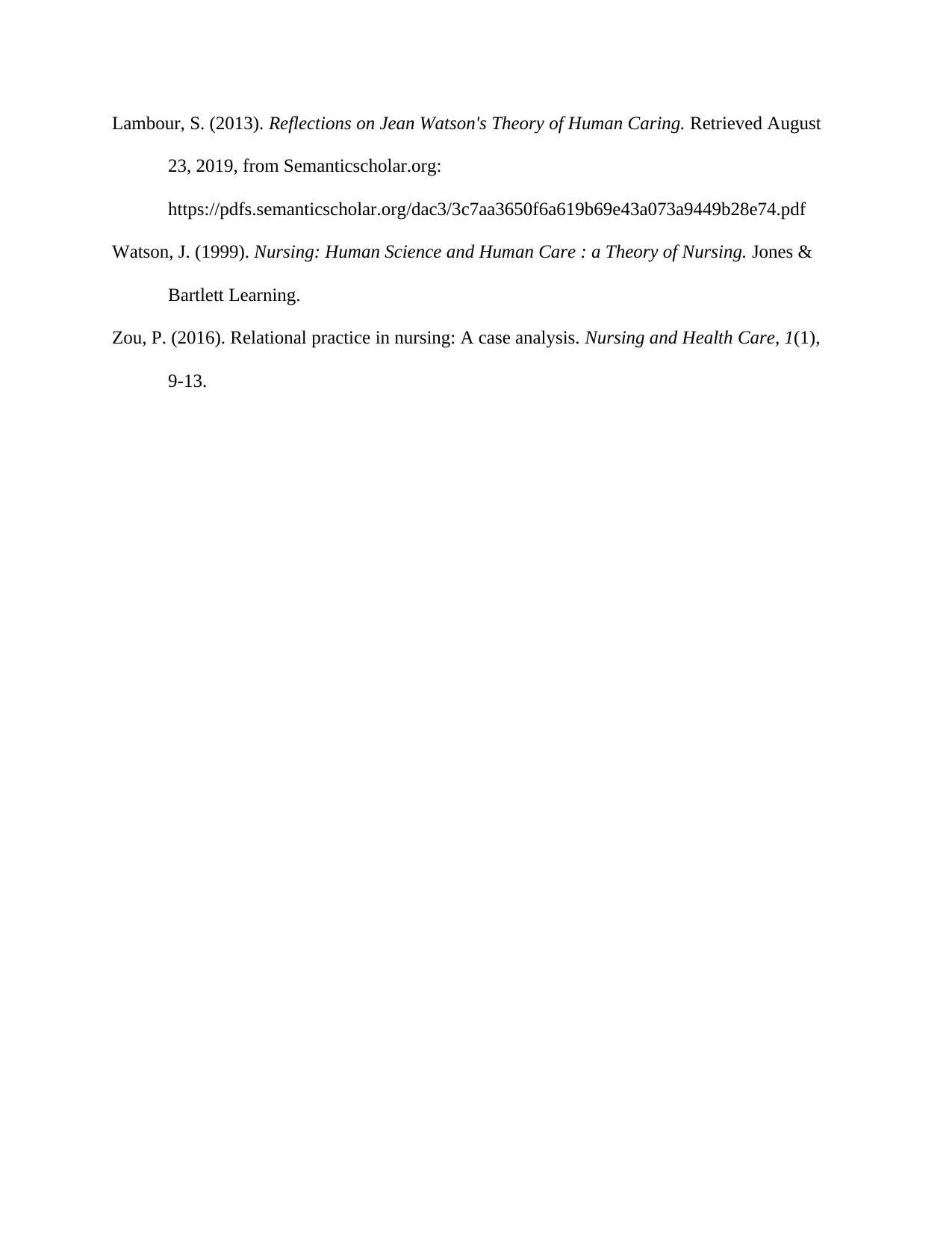
Lambour, S. (2013). Reflections on Jean Watson's Theory of Human Caring. Retrieved August
23, 2019, from Semanticscholar.org:
https://pdfs.semanticscholar.org/dac3/3c7aa3650f6a619b69e43a073a9449b28e74.pdf
Watson, J. (1999). Nursing: Human Science and Human Care : a Theory of Nursing. Jones &
Bartlett Learning.
Zou, P. (2016). Relational practice in nursing: A case analysis. Nursing and Health Care, 1(1),
9-13.
23, 2019, from Semanticscholar.org:
https://pdfs.semanticscholar.org/dac3/3c7aa3650f6a619b69e43a073a9449b28e74.pdf
Watson, J. (1999). Nursing: Human Science and Human Care : a Theory of Nursing. Jones &
Bartlett Learning.
Zou, P. (2016). Relational practice in nursing: A case analysis. Nursing and Health Care, 1(1),
9-13.
1 out of 5
Related Documents
Your All-in-One AI-Powered Toolkit for Academic Success.
+13062052269
info@desklib.com
Available 24*7 on WhatsApp / Email
![[object Object]](/_next/static/media/star-bottom.7253800d.svg)
Unlock your academic potential
Copyright © 2020–2026 A2Z Services. All Rights Reserved. Developed and managed by ZUCOL.





